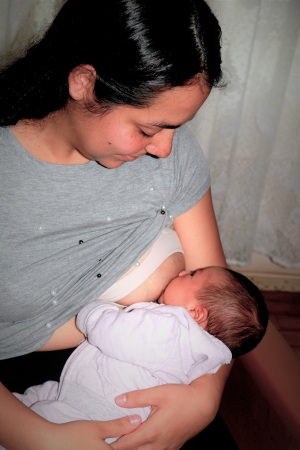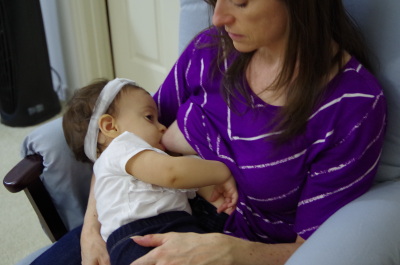
This article explores the myriad of reasons why women in the US (and other countries, too) wean their babies so early. Some of them include: working, formula companies' aggressive promotions, lack of support, difficulties with breastfeeding itself, difficulties with public breastfeeding, and misconceptions about nursing.
Right after birth the baby is placed on Mommy's bare breast. It knows instinctively to latch on and starts sucking. Mommy's breast feels so good and soft!

During the following weeks, baby feeds very often, even several times during the same hour. Mother and baby get used to breastfeeding and learn the right positions with the help of friends and other supportive people. Other women help the mother with breastfeeding problems if they arise.
Baby and mother grow to love each other a lot and enjoy the closeness of breastfeeding. Breast gives baby comfort as well as food — and thereby baby grows well and is very happy. Baby does not need security blankets or pacifiers — it uses Mommy's soft and cuddly two breasts instead!

Somewhere along the way solid foods are introduced, but baby continues to nurse, too. Even during the toddler years the little child nurses here and there, especially when going to sleep or during times of stress.
Nursings get less and less, being only a few times a week. Finally the child weans itself willingly, without getting any emotional trauma from leaving its 'security blanket' behind.
Sounds ideal... and it is, but in reality breastfeeding is not always this easy! Fortunately breastfeeding rates have slowly been increasing since the 1990s, but only 55.8 percent (up from 44.3% in 2008) of US infants are still being breastfed at 6 months, as found by the National Immunization Survey in 2019. And even though experts recommend exclusive breastfeeding for 6 months, the same survey found that only 45.3% (up from 35% in 2008) of mothers at 3 months and just 24.9% (up from 14.8% in 2008) at 6 months were doing so.

Bottle-feeding is perceived as the norm. People in the USA and many western cultures simply live in a bottle-feeding culture. It is very unusual to see a breastfeeding mother, and even more unusual to see a mother nursing a toddler or an older child – yet even World Health Organization recommends breastfeeding for at least two years. Television, books, Internet, and media usually show a baby with a bottle, not a baby at its mother's breast. Little girls grow up perceiving formula-feeding as the norm.
Mother thinks breastfeeding is yucky or indecent, or has 'hangups' about her own breasts. Breasts are to feed babies – if that was not so, why do breasts start making after mother gives birth (or tiny amounts even before)? There is nothing indecent about feeding your baby. Think about a mother cat feeding her kitties, or a dog feeding her puppies. Everybody just thinks that is cute and natural – the same is true for humans feeding their babies.
"A comment we received in February 2006:
Thank you for sharing photos of real breasts. I didn't breast feed my first 3 children because of my hangups and embarrassment over my very large breasts. While pregnant with my 4th baby this past year I came across this site and it helped me to accept my breasts, even love them! I now am the proud mama of a 2 month old who absolutely LOVES his mama's milk!!! And by openly nursing my odler children, both boys are learning that that breasts are for nourishing babies. Thank you so much for showing *reality*!!!!
Beth

Mother's past sexual abuse. One out of every five American women has been sexually abused during childhood, and it is estimated about 20% of those show significant symptoms as adults. There are wide reactions to past sexual abuse: some women who have been sexually abused cannot tolerate the thought of breastfeeding while others find breastfeeding as a healing experience. Especially difficult situations include: the early postpartum period with its high demands; night-time feedings since the night may remind the mother of earlier abuse; and feeding an older infant who plays with the breast and smiles at it. These mothers may benefit from extra support of those around her or from mental health professionals, from partial pumping/bottlefeeding, and from extra reassurance to know what is normal behavior by the baby and how to redirect baby's behavior. On the other hand, breastfeeding can actually reduce child abuse and abandonment by mothers.
Husband or partner's negative opinions. Unfortunately many men think woman's breasts are sexual organs, so they can become jealous over the nursing mom's breasts, or start thinking that the baby is doing something indecent and pervert when it feeds. Breastfeeding is NOT a sexual act but simply a feeding act. It can be pleasurable to the mother (though also painful!), but it is not sensual pleasure, just a good feeling of being close to your baby.
Unsupportive friends or family members. Since bottle feeding was the norm in the near past, often a new mom's own mother and other relatives know very little about breastfeeding or even have negative experiences, and cannot support her. In fact, she might hear all kinds of undermining comments from ignorant people who don't understand the breastfeeding process. If that happens, you can try to explain to them in a nice way what the facts are.

Lack of knowledge of medical care personnel. Some doctors know very little about breastfeeding or know nothing about the dangers of infant formula, so won't really encourage the woman to breastfeed, or simply won't influence the mother in any direction.
While there are many pediatricians and obstetricians who do strongly support and speak for breastfeeding, you cannot count your doctor being that way unless you choose who is going to be your doctor.
"Women also need to know about the very real 'risks' of bottle-feeding, including higher morbidity and mortality during childhood, higher rates of cancer and diabetes in adulthood, and poorer cognitive development."
Katherine Dettwyler
Problems in breastfeeding. These include sore nipples, milk supply problems, thrush, infections, etc. By far most of the breastfeeding problems are solvable with adequate information and support. One of the usual initial problems is sore nipples, or simply pain while nursing. That is very common, and usually subsides after about one month. Just hang in there, make sure the positioning is right and baby has a good latch, and find support from someone or from online. It will get easier later, and you'll be glad for your decision.
Medical conditions. Certain medications that the mother may have to take are not compatible with breastfeeding. However, many medications are fine.
Mismanagement of breastfeeding. Breastfeeding works best when baby is put to the breast very soon after birth, and is allowed to feed as frequently as she wants – which is called "cue feeding" or "demand feeding". Mother's milk supply is built up by the frequent feeding (which may mean every 30 minutes to every two hours), and this is important especially in the beginning. But wrong ideas about "nursing schedules" still persist, based on bottle-fed babies' needs. Not feeding frequently can lead to low milk supply.
Another pitfall is that many women don't understand the danger of supplemental formula in regards to the "demand=supply" principle of milk production. The more formula you give to your baby in addition to breast milk, the less milk your breasts produce. Formula companies know this, and that is why they are so eager to give you free samples from every direction.

Difficulties with public breastfeeding. Even though breastfeeding in public is perfectly legal in the US in any place where the mother and baby would otherwise be allowed, women have had to leave swimming pools, supermarkets, restaurants, malls etc., or they have been told to nurse in the bathroom. Since breasts are perceived as sexual, it is often hard for women to be brave enough to breastfeed in public because they fear other people's attitudes about exposing their breasts.
Because of the general attitudes American society has about breastfeeding and of breasts, many women won't feel totally free and at ease when nursing in public, but in reality most mothers, when they get over the initial fears, find that the general public doesn't pay that much attention to the act, for the most part. People can almost seem to avoid watching the nursing mother in order to not make her feel uncomfortable. In fact, if someone appears to be watching, it may very well be that the person is just plain curious to see this precious moment of mother nurturing her child.
Misconceptions about weaning. Many people in the US think that breastfeeding is only for the first couple of months of an infant's life, or mostly up to year. Experts don't agree with this. World Health Organization (WHO) recommends breastfeeding to 2 years of age, and American Academy of Pediatrics clearly states in their policy statement Breastfeeding and the Use of Human Milk, "Exclusive breastfeeding is ideal nutrition and sufficient to support optimal growth and development for approximately the first 6 months after birth." "It is recommended that breastfeeding continue for at least 12 months, and thereafter for as long as mutually desired."
In many other cultures worldwide and in most of the history of mankind children weaned even much later. Comparing humans to our closest animal relatives, Katherine Dettwyler has estimated that the natural age of weaning in humans would be between 2.3 and 7 years. Many women in the world and even in today's America do let children self-wean, and those allowed to do so usually wean between 2 and 5 years of age. The benefits of breastfeeding don't stop at a particular age, such as 1 year or 2 years. Many people think that little children "need" to drink cow's milk – how much better it is when toddlers can get HUMAN milk with just the right nutrients for HUMANS!
Working. On a whole, the American society does not give mothers a long maternity leave or otherwise encourage mothers to stay at home so breastfeeding would be easier. Nor is it common to find facilities at the workplace for pumping, though this seems to be on the increase.
So even though the best solution would of course be if women could stay home longer, you can still pump breastmilk while at work, and continue normal nursing when at home, or possibly arrange your baby to be brought to you at certain hours, if that is feasible. Breastfeeding doesn't have to end just because you return to work after maternity leave!

One of the most influental reasons why women fail to breastfeed is because infant formula companies use the most aggressive and insinuative forms of advertising. Also, about half of all the infant formula used in the United States is purchased for poor women through the federal Special Supplemental Nutrition Program for Women, Infants and Children (WIC).
A study published in 2003 by the U.S. Preventive Services Task Force found that giving new mothers a pamphlet on breastfeeding as they leave hospital, is ineffective – and it recommended that mothers take classes instead. According to the study, mothers who take counseling programs are much more likely to try breastfeeding and continue for longer.
Many mothers leave hospital with little more than a pamphlet informing them of the benefits of breastfeeding – and a gift packet from formula manufacturers with coupons and infant formula samples. Yet some studies have found that those commercial gift packets decrease the change that a woman would breastfeed and reduce the duration of breastfeeding.
The danger with supplementing breastfeeding with formula is that a mother's milk production is a situation of SUPPLY=DEMAND. So when she gives the baby some formula, her own milk production with DIMINISH accordingly... the breasts adjust the supply in real time. Formula companies know that well, and that is the main reason for giving the free samples: once a mother gets started with formula, her milk supply starts going down, and it is soooo easy then to just keep giving more formula, more formula, etc.

Now, it is certainly possible to also increase one's milk supply with the right measures – mainly by nursing and pumping more and more often, which INCREASES milk production. But new moms need to be aware of how breastfeeding works and how formula companies try to take advantage of them so they don't fall prey to this situation.
Most all of these problems can be avoided if the mother has adequate support and is well-informed about breastfeeding! Though it is natural, breastfeeding success is not automatic. If you are pregnant and planning to breastfeed, study as much as you can, attend classes, and make a list of support people, lactation consultants, phone numbers, internet addresses etc. where you can find help should some breastfeeding problem emerge. Being informed and getting help from the professionals can help you to overcome the small, but common breastfeeding problems in the beginning. Breastfeeding does not have to be difficult! The greatest obstacles for breastfeeding are misinformation and lack of support.
... if women have encouragement from their culture, from their mom, their father, their girlfriends, their husband, they tend to breastfeed very successfully and very naturally. But in our culture, in spite of the fact that doctors promote it, it really isn't accepted. You know, women have been arrested for breastfeeding in public. They've been kicked out of malls for breastfeeding. I had a friend who, was opened her blouse to breastfeed her baby, and her father said, "That's disgusting," and walked out of the room.
Carolyn Latteier in Berman & Berman's TV program "All about breasts".
It seems that everybody agrees that breast milk is better, but
a big part of the society is negative about breastfeeding? Why is that?
The story continues...